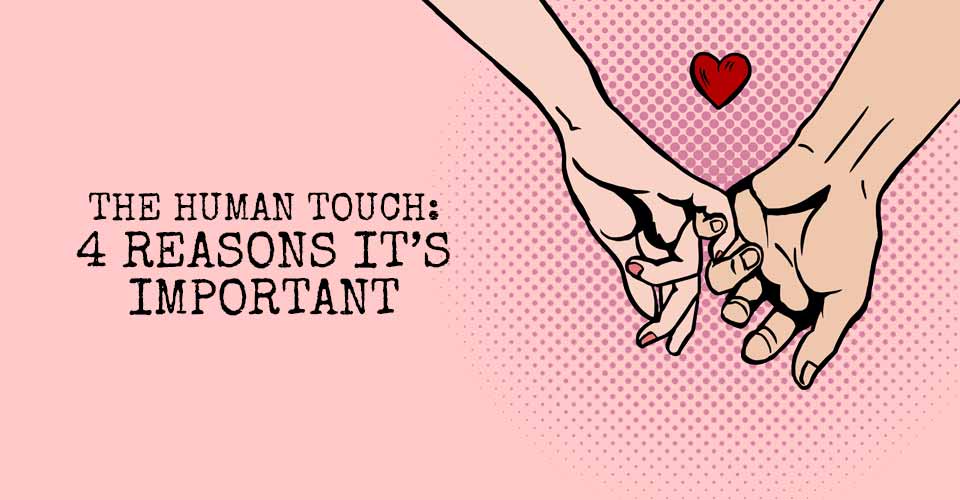As human beings, we need physical contact.
To a greater or lesser extent, it is part of our culture. Some nations exchange hugs and kisses when they meet each other, or when they meet someone for the first time. These are the Spaniards, the Italians, the French, to name a few. Other people such as the British, for example, are more reserved, especially with strangers.
Conservative or more open, we all shake hands when we meet. By stretching out your right hand to the person you meet for the first time, you make a gesture to show them you are not armed, and you mean no harm.
Touch between adults in the modern world has been ridden with all sorts of prejudices. Unfortunately, people who are too touchy run the risk of having their behavior misinterpreted for making sexual advancements.
At the same time, the non-sexual or, as some call it, “Platonic”, touch is an important way to bond and communicate. In the past, our palms were like the vocal cords of body language because they did more ‘talking’ than any other body part. Consequently, hiding your palms from your interlocutor would mean you were trying to conceal something from them.
Here are four reasons we need to become more touchy-feely in our everyday life:
1. Just one hug a day keeps the doctor away
There are many incredible benefits of cuddling. A hug doesn’t only feel good – it’s good for you. A recent research has shown that regular hugs lower a person’s heart rate and blood pressure. This is not just a short-term effect. Rather, hugs make us healthier and happier in general. Loving platonic touch such as hugging has also been shown to strengthen the immune system, decrease stress, and reduce anxiety.
“Being hugged by a trusted person may act as an effective means of conveying support and increasing the frequency of hugs might be an effective means of reducing the deleterious effects of stress,” said Sheldon Cohen, a Carnegie Mellon University Professor of Psychology.
Being hugged by a stranger is just as good, believe me. There’s one guy, who’ve dedicated his life to giving free hugs to people. Ken Nwadike Jr, also known as “the free hugs guy” is a is an American documentary filmmaker, motivational speaker, and peace activist, whose Free Hugs Project has made him world famous.
“The apparent protective effect of hugs may be attributable to the physical contact itself or to hugging being a behavioral indicator of support and intimacy. Either way, those who receive more hugs are somewhat more protected from infection.”
2. Physical contact strengthens team dynamics by building non-sexual intimacy.
When we touch someone appropriately – with a handshake, a high-five, or a pat on the back – we are sending them a non-verbal message of support and cooperation. The benefits of such gestures are as much personal, as they are economic.
Daniel Keltner, the founding director of the Greater Good Science Center and Professor of Psychology at University of California – Berkeley, studied the role of touch in the context of NBA basketball teams. His research found that teams whose players touch each other more often win more games. Could the same be true for the accounting team in your workplace, or the PTA at your child’s school?
Maybe, but please be careful when touching coworkers, as your gestures of encouragement and support may be misinterpreted for harassment.
3. Physical touch promotes trust and security.
Physical touch is so important. As stated above, the handshake has been widely accepted as a universal gesture of goodwill and openness. This is why many people determine someone’s trustworthiness by the quality of their handshake.
Ray Williams explored this in his article: Why Have We Lost The Need For Physical Touch?. As he explains, “Neuroscientist Edmund Ross [found] that physical touch activates the brain’s orbitofrontal cortex, which is linked to feelings of reward and compassion. [Daniel] Keltner contends that ‘studies show that touch signals safety and trust, it soothes. It activates the body’s vagus nerve, which is intimately involved with our compassion response and a simple touch can trigger release of oxytocin, aka ‘the love hormone.’”
4. People who experience lots of physical contact are less violent.
It has been scientifically proven that children who do not experience enough loving physical affection are more prone to violence once they reach adulthood. Neuropsychologist James W. Prescott determined that violence in society often correlates with a lack of cultural emphasis on maternal bonding. When a child experiences loving touch, they learn to attach to others in a healthy way. As they grow, they are less likely to use touch in a hurtful or aggressive way. This early touch paves the way for emotional stability. The results are not only personal, but societal.
Our lack of non-sexual physical touch is a greater cultural problem than we think.
Mark Greene explored this phenomenon beautifully in his article for The Good Men Project titled Touch Isolation: How Homophobia Has Robbed All Men Of Touch. “This touch thing is so crucial,” he wrote. “I kiss and hug my son constantly. He sits with me and on me. I make a point of connecting with him physically whenever I greet him. The physical connection I have with him has been transformative in my life teaching me about my value as a human being and a father.”



